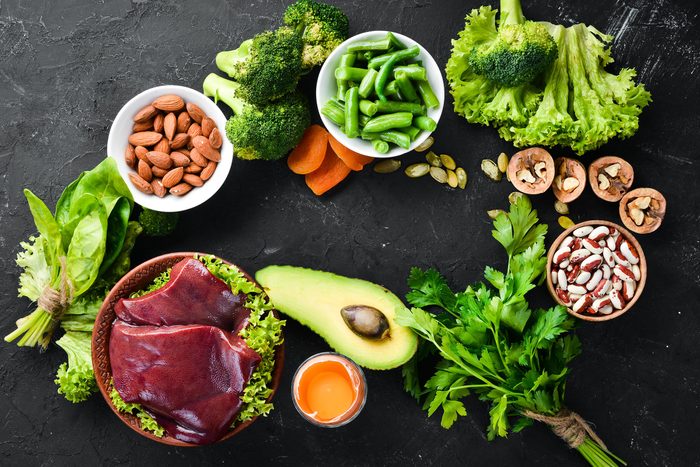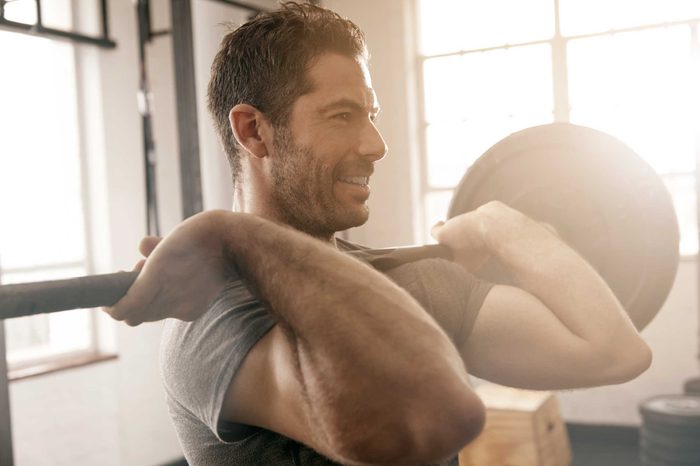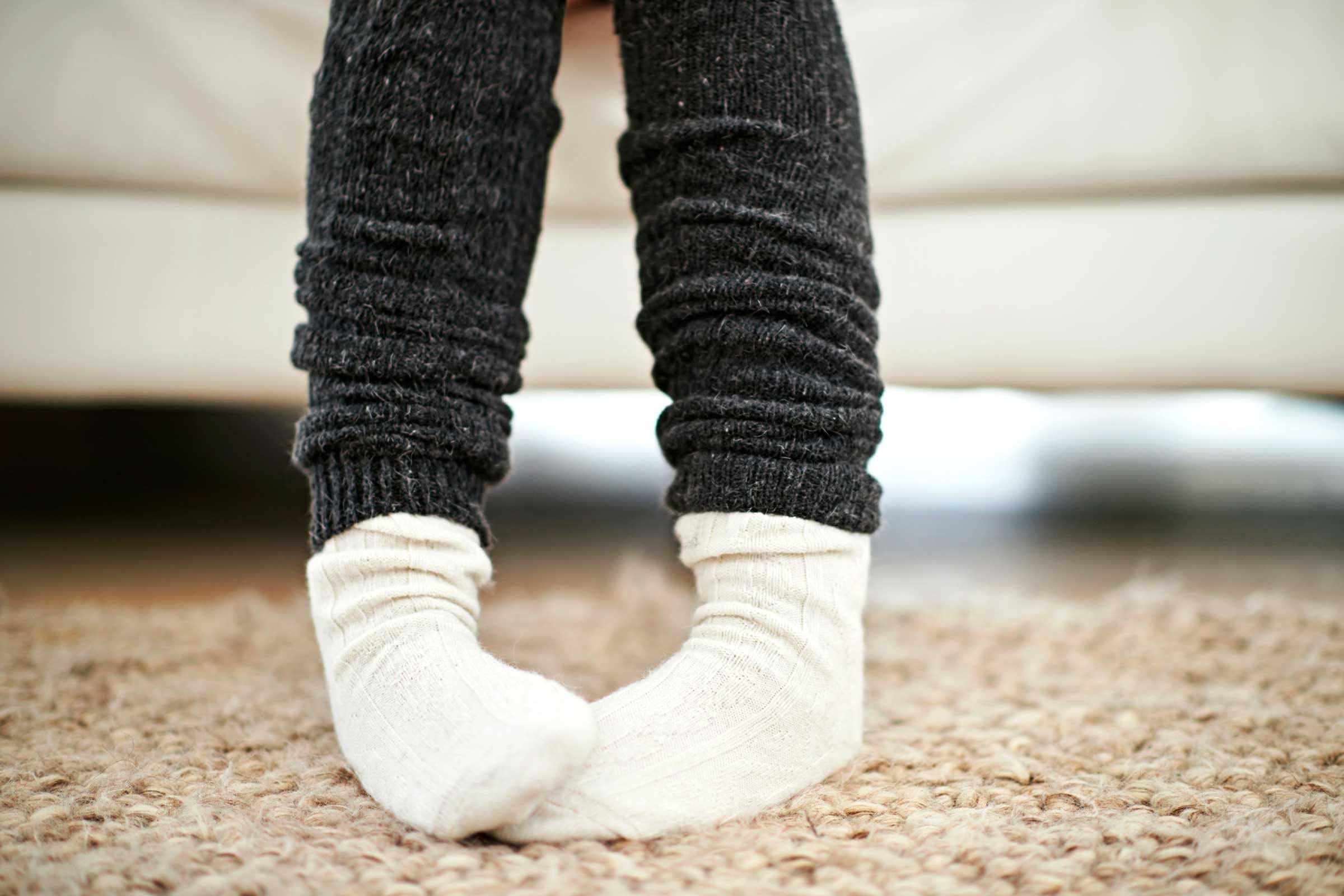
You have low iron levels
If you’re constantly wondering: ‘Why am I always cold?’, iron-deficiency anemia might be to blame. Red blood cells need iron to carry oxygen into the blood, and low levels of iron could hurt your circulation, says registered dietitian nutritionist Alyssa Tucci, RDN, a registered dietitian in New York, NY. “Coldness in extremities—hands and feet—is most pronounced, because the body is smart, so it diverts blood to vital organs like the heart and brain first,” she says. Meat is the most common dietary source of iron. Leafy greens and legumes are good sources, but pair them with a vitamin C-rich food like red pepper for maximum absorption, she says; it’s harder to absorb iron from plants. Don’t ignore these other signs of iron deficiency, either.

You need more vitamin B12
“People might assume they’re not getting enough iron when it’s really a B12 issue,” says Andrea Moss, a certified holistic nutrition coach in New York, NY. Vitamin B12 anemia can cause coldness, numbness, and low energy, she says. Like iron, most B12-rich foods are animal products, so vegetarians might have a tough time getting enough. Vitamin B12 is found in eggs, yogurt, and cheese. Vegans can sprinkle nutritional yeast—a cheesy-tasting powder—on popcorn or baked potatoes. If you are a vegan, ask your doctor to periodically check your vitamin B12 levels to make sure you’re getting enough. Nutritional yeast isn’t always enough to ensure adequate levels of the vitamin.

You have a thyroid condition
When your body doesn’t produce enough thyroid hormone to regulate your metabolism, you could end up feeling cold all the time, says Margarita Rohr, MD, an internal medicine specialist at New York University Langone Medical Center in New York, NY. If you’re experiencing other symptoms of thyroid disease, such as hair loss, constipation, weight gain or fatigue, go to a doctor for a blood test for hypothyroidism, she says. In the meantime, watch out for these silent thyroid symptoms.

You have low body weight
Being underweight could mean you’re always cold for two reasons, Tucci says. Fat works as an insulator, so having less fat might mean you can’t hold heat well. Plus, cutting calories can slow your metabolism, giving your body less energy to heat itself. “Your body is smart and doesn’t want to use energy if it’s worried that energy is scarce,” Tucci says. If you’re trying to gain weight, Tucci recommends stocking up on calorie-dense foods with good fats, such as nut butter, full-fat Greek yogurt, and dried fruit.

You skip out on sleep
Not getting a good amount of sleep is another reason you might always be wondering, “Why am I always cold?” Although research on sleep and feeling cold is mixed, chronic fatigue can slow down your metabolism, leaving you feeling chilly during the day, Moss says. Plus, your body temperature fluctuates at night, and your body gets used to that cycle, Dr. Rohr adds. If you’re staying up later than usual, your core body temperature might drop during the same time it would if you were asleep.

You’re dehydrated
When your body doesn’t have enough water, it can’t circulate blood as effectively, Tucci says. Water also holds heat, meaning dehydration could leave your body without H2O’s temperature-retaining benefits. To keep yourself hydrated, aim to drink half your weight in ounces of water, she recommends. For example, if you weigh 150 pounds, try and sip 75 ounces throughout the day. Here are more ways your body changes when you drink enough water.

You could be experiencing diabetes complications
Diabetics can develop peripheral neuropathy, which damages nerves in charge of the senses. This diabetes complication means you may feel always cold or feel pain or heat seemingly without reason, Dr. Rohr says. “It may not be physical, but just the sensation of being cold,” she says. “It’s just an error in the message sent to the brain from the feet or hands.” Watch out for these other strange symptoms of serious diseases.

You don’t eat enough fat
There’s a reason you crave warm, hearty foods in the winter. “Fat helps us feel satiated and helps us feel warmer,” Moss says. Low-fat diets that replace healthy foods like avocado, nuts, and seeds with cooling foods such as fruits and juices might leave you feeling cold, she says. Don’t miss more signs you need to eat more fat.

You have Raynaud’s
A small percentage of the population suffers from Raynaud’s, which causes spasms in arteries in the hands, feet, and face, Dr. Rohr says. “When exposed to cold, the spasm makes circulation to those areas worse, and they tend to feel colder,” she says.

You have poor circulation
In some cases, poor circulation is caused by a chronic condition like vascular disease or peripheral arterial disease. If your extremities are cold but can’t be linked to a chronic condition, you might just have naturally poor circulation and feel always cold. Moss recommends exercising regularly and trying acupuncture to bring feeling back to your hands and feet.

You don’t have enough muscle
Muscle mass produces heat, keeping the rest of your body warm, Dr. Rohr says. Make sure to stay active and keep up a good exercise routine, she says.

You’re a woman
There’s anecdotal evidence that women often feel colder than men (see who’s voted most likely to steal the covers or raise the office thermostat) but not a ton of scientific evidence. That said, a 1998 study did find that women’s core temperatures tend to be about 0.4 degrees Fahrenheit warmer than men’s, their hands are almost 3 degrees colder on average, a University of Utah study found. “It’s not a huge difference, but it might be why women have the sensation of feeling colder,” Dr. Rohr says. Now, find out how to feel warmer in cold weather.
